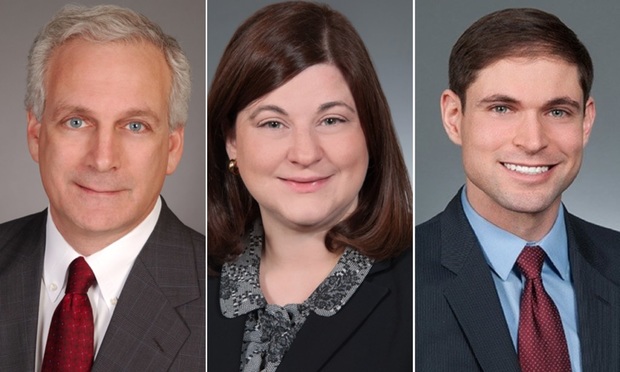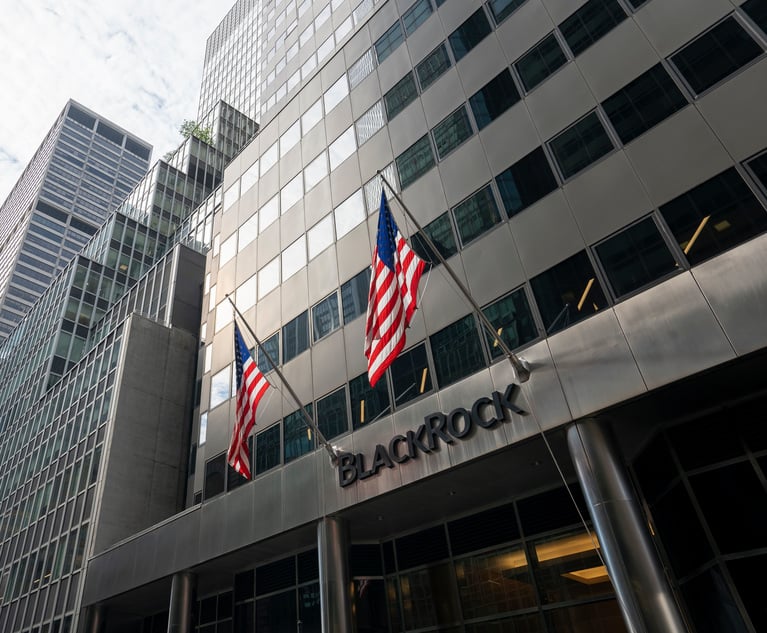'Assured' Uncertainty: Why First Circuit's Decision Related to Puerto Rico's Insolvency May Shake Up the Municipal Bond Market
The First Circuit missed an opportunity to provide bondholders with much-needed certainty concerning their ability to enforce an issuer's obligation to pay from special revenues pledged to secure their bonds in the event of a municipality's insolvency proceeding without first obtaining relief from the automatic stay.
September 04, 2019 at 11:00 AM
8 minute read
 Patrick P. Dinardo, Amy A. Zuccarello and Nathaniel R.B. Koslof
Patrick P. Dinardo, Amy A. Zuccarello and Nathaniel R.B. Koslof
 A debate that just concluded in the U.S. Court of Appeals for the First Circuit over bondholder rights may have significant implications for municipalities and their ability to raise money for critical infrastructure projects. By denying the bondholder-creditor's petition for rehearing en banc, the First Circuit missed an opportunity to provide bondholders with much-needed certainty concerning their ability to enforce an issuer's obligation to pay from special revenues pledged to secure their bonds in the event of a municipality's insolvency proceeding without first obtaining relief from the automatic stay.
A debate that just concluded in the U.S. Court of Appeals for the First Circuit over bondholder rights may have significant implications for municipalities and their ability to raise money for critical infrastructure projects. By denying the bondholder-creditor's petition for rehearing en banc, the First Circuit missed an opportunity to provide bondholders with much-needed certainty concerning their ability to enforce an issuer's obligation to pay from special revenues pledged to secure their bonds in the event of a municipality's insolvency proceeding without first obtaining relief from the automatic stay.
Section 362 of the U.S. Bankruptcy Code (11 U.S.C. §101 et seq.) automatically stays a broad variety of creditor actions against the debtor or the debtor's property upon the debtor's filing of a bankruptcy petition. See 11 U.S.C. §362(a). Although the magnitude of impact remains to be seen, the First Circuit's failure to rectify an earlier controversial decision of the First Circuit panel may undermine confidence in the municipal bond market and deter future investment. A powerful dissent suggests that this issue is ripe for corrective legislative action and/or Supreme Court review. Assured Guar. v. Fin. Oversight & Mgmt. Bd. for P.R. (In re Fin. Oversight & Mgmt. Bd. for P.R.), Nos. 18-1165, 18-1166, 2019 U.S. App. LEXIS 22768, at *25 (1st Cir. July 31, 2019) (Lynch, J., dissenting) ("I believe that further review is warranted, if not by this court, then by the Supreme Court.").
On July 31, 2019, the U.S. Circuit Judge William J. Kayatta Jr., joined by a majority of the active First Circuit judges, authored a decision denying a petition for rehearing en banc related to the insolvency proceeding of the Commonwealth of Puerto Rico. In re Fin. Oversight & Mgmt. Bd. for P.R.), 2019 U.S. App. LEXIS 22768, at *7 (1st Cir. July 31, 2019). In so doing, the majority refused to revisit the March 26, 2019 decision of a panel of First Circuit judges, which affirmed the Jan. 30, 2019 decision of the U.S. District Court of Puerto Rico (Swain, J.). Assured Guar. v. Carrion (In re Fin. Oversight & Mgmt. Bd. for P.R.), 919 F.3d 121, 132 (1st Cir. 2019); affirming In re Fin. Oversight & Mgmt. Bd., 582 B.R. 579, 596 (D.P.R. 2018) (dismissing certain claims because "neither Section 922(d) nor Section 928 requires or empowers the Court to order the payment of the pledged special revenues to the PRHTA Bondholders.").
By allowing the panel's decision to stand, the First Circuit held, among other things, that the "automatic stay" imposed by §362(a) of the Bankruptcy Code, which comes into effect upon the commencement of a bankruptcy proceeding, prohibits a bondholder-creditor from pursuing an action against a municipal debtor (i.e., the Commonwealth of Puerto Rico) to compel the continued payment of special revenues to service the issuer's revenue bonds. In so doing, the First Circuit endorsed the panel's interpretation of §§922(d) and 928 of Chapter 9 of the Bankruptcy Code. The decision deals a significant blow to the expectations of the municipal bond market.
In the decision, the majority employs a highly textual approach to statutory interpretation and ignores (or dismisses) significant legislative history suggesting a contrary legislative intent. Section 922(d) provides: "(d) Notwithstanding section 362 of this title and subsection (a) of this section, a petition filed under this chapter does not operate as a stay of application of pledged special revenues in a manner consistent with section 927 [sic] of this title to payment of indebtedness secured by such revenues." 11 U.S.C. §922(d) (emphasis added); see also 11 U.S.C. §902(2) (defining "special revenues"). Section 928 provides, in relevant part: "[S]pecial revenues acquired by the debtor after the commencement of the case shall remain subject to any lien resulting from any security agreement entered into by the debtor before the commencement of the case … ." 11 U.S.C. §928.
Despite acknowledging "some ambiguity in the text of section 922(d)," the majority rejects this ambiguity "as license to hunt the legislative record for bigger game … ." In re Fin. Oversight & Mgmt. Bd. for P.R., 2019 U.S. App. LEXIS 22768, at *12. Ultimately, the majority held that (1) §§922(d) and 928 merely "facilitate[] voluntary payments from a municipal debtor … to a creditor …," id. at *22, and (2) "[§§] 922 and 928 of the municipal bankruptcy code do not afford creditors a shortcut to bypass the requirement of obtaining traditional stay relief in order to bring such an enforcement action." Id. at *7.
The U.S. Circuit Judge Sandra L. Lynch authored a thorough and compelling dissent. At the outset, the dissent reframed the questions from (1) whether the bondholders could initiate an enforcement action without leave from the automatic stay, to (2) "whether, under municipal bankruptcy law, the government debtor must continue to pay pledged special revenues to special revenue bondholders during a bankruptcy proceeding … ." Id. at *25. With the issue framed in this manner, Judge Lynch suggests that the only answer consistent with the text and legislative intent is yes, municipal debtors must continue paying pledged special revenues to special revenue bondholders. As a consequence or corollary of this conclusion, bondholders must be free to initiate an enforcement action if necessary to receive the benefit of the municipal debtor's obligation to them, without the burden of first seeking relief from the stay.
In explaining her reasoning, Judge Lynch first states that because the text of §§922(d) and 928 is ambiguous, "[a]ny interpretation of the text … requires resort to both context and legislative history." Id. at *27. Moreover, she argues that the majority decision fails to appreciate the historical context and specific legislative action taken by Congress to protect the municipal bonds market. Her dissent cogently describes the events leading up to the enactment of §§922(d) and 928, which were added as part of the 1988 amendments. In 1976, in an effort to address certain concerns regarding aspects of municipal bankruptcy law, Congress amended the law concerning municipal bankruptcy in significant ways. See Act to Amend Chapter IX of the Bankruptcy Act, Pub. L. No. 94-260, 90 Stat. 315 (1976). In 1978, Congress enacted the Bankruptcy Code, including Chapter 9, incorporating by reference a number of concepts from the law of corporate bankruptcy. This blanket incorporation of corporate bankruptcy concepts into municipal bankruptcy law proved problematic in the following decade, prompting Congress to enact the 1988 amendments, which sought to remedy the "inconsistencies between bankruptcy law and principles of municipal finance." H.R. Rep. No. 100-1011, at 3 (1988); accord S. Rep. No. 100-506, at 1.
According to the dissent, in addition to the majority's failure to properly consider the historical context and legislative history surrounding the applicable sections of the Bankruptcy Code, the majority decision further fails to appreciate the unique characteristics of revenue bonds that have made them appealing to lenders. Historically, an attractive characteristic of revenue bonds is that they were considered "bankruptcy remote" and provided revenue streams that were exempt from the automatic stay. See, e.g., Pruskowski, et al., "The Appeal of Dedicated Tax Bonds," BlackRock ("[T]here are a number of inherent strengths in dedicated-tax bonds that make them particularly attractive investments … . Bankruptcy remote. Because they are supported by a special revenue stream pledged by the government, dedicated-tax bonds are less likely than other categories of debt to be subject to default should an issuer declare bankruptcy … . Chapter 9 exempts 'special revenue' liens from the automatic stay, provided they meet certain criteria. This allows dedicated revenues to continue to be used for the retirement of debt service on a timely basis, after the payment of normal operating expenses.").
Unlike general obligation bonds, revenue bonds are issued to finance specific projects or programs, and the revenues from these projects/programs are pledged as the sole source of repayment for bondholders. As such, revenue bonds are priced according to the prospects of the particular project or program, and the general creditworthiness of the municipality is immaterial. However, the majority decision shifts the risk associated with municipal bonds back to the bondholders by precluding their ability to collect pledged special revenues from these revenue bonds in the event of a municipal insolvency without first seeking relief from the automatic stay. Now, prospective municipal lenders must consider the general creditworthiness of the municipality prior to making any investment in municipalities, which will undoubtedly impact the pricing of municipal bonds going forward. Given the ongoing and ever-present need for our municipalities to upgrade and replace infrastructure, the implications of the First Circuit's decision could prove costly without further clarification from the courts or from Congress.
Patrick P. Dinardo and Amy A. Zuccarello are partners, and Nathaniel R.B. Koslof is an associate, at Sullivan & Worcester in Boston.
This content has been archived. It is available through our partners, LexisNexis® and Bloomberg Law.
To view this content, please continue to their sites.
Not a Lexis Subscriber?
Subscribe Now
Not a Bloomberg Law Subscriber?
Subscribe Now
NOT FOR REPRINT
© 2025 ALM Global, LLC, All Rights Reserved. Request academic re-use from www.copyright.com. All other uses, submit a request to [email protected]. For more information visit Asset & Logo Licensing.
You Might Like
View All
John Deere Annual Meeting Offers Peek Into DEI Strife That Looms for Companies Nationwide
7 minute read
Wells Fargo and Bank of America Agree to Pay Combined $60 Million to Settle SEC Probe

Who Got the Work: Gibson Dunn and Wilmer to Defend BlackRock in ESG Antitrust Lawsuit
2 minute read
Trump Mulls Big Changes to Banking Regulation, Unsettling the Industry
Trending Stories
- 1CFPB Labor Union Files Twin Lawsuits Seeking to Prevent Agency's Closure
- 2Crypto Crime Down, Hacks Up: Lawyers Warned of 2025 Security Shake-Up
- 3Atlanta Calling: National Law Firms Flock to a ‘Hotbed for Talented Lawyers’
- 4Privacy Suit Targets Education Department Over Disclosure of Student Financial Data to DOGE
- 5Colwell Law Group Founder Has Died in Skiing Accident
Who Got The Work
J. Brugh Lower of Gibbons has entered an appearance for industrial equipment supplier Devco Corporation in a pending trademark infringement lawsuit. The suit, accusing the defendant of selling knock-off Graco products, was filed Dec. 18 in New Jersey District Court by Rivkin Radler on behalf of Graco Inc. and Graco Minnesota. The case, assigned to U.S. District Judge Zahid N. Quraishi, is 3:24-cv-11294, Graco Inc. et al v. Devco Corporation.
Who Got The Work
Rebecca Maller-Stein and Kent A. Yalowitz of Arnold & Porter Kaye Scholer have entered their appearances for Hanaco Venture Capital and its executives, Lior Prosor and David Frankel, in a pending securities lawsuit. The action, filed on Dec. 24 in New York Southern District Court by Zell, Aron & Co. on behalf of Goldeneye Advisors, accuses the defendants of negligently and fraudulently managing the plaintiff's $1 million investment. The case, assigned to U.S. District Judge Vernon S. Broderick, is 1:24-cv-09918, Goldeneye Advisors, LLC v. Hanaco Venture Capital, Ltd. et al.
Who Got The Work
Attorneys from A&O Shearman has stepped in as defense counsel for Toronto-Dominion Bank and other defendants in a pending securities class action. The suit, filed Dec. 11 in New York Southern District Court by Bleichmar Fonti & Auld, accuses the defendants of concealing the bank's 'pervasive' deficiencies in regards to its compliance with the Bank Secrecy Act and the quality of its anti-money laundering controls. The case, assigned to U.S. District Judge Arun Subramanian, is 1:24-cv-09445, Gonzalez v. The Toronto-Dominion Bank et al.
Who Got The Work
Crown Castle International, a Pennsylvania company providing shared communications infrastructure, has turned to Luke D. Wolf of Gordon Rees Scully Mansukhani to fend off a pending breach-of-contract lawsuit. The court action, filed Nov. 25 in Michigan Eastern District Court by Hooper Hathaway PC on behalf of The Town Residences LLC, accuses Crown Castle of failing to transfer approximately $30,000 in utility payments from T-Mobile in breach of a roof-top lease and assignment agreement. The case, assigned to U.S. District Judge Susan K. Declercq, is 2:24-cv-13131, The Town Residences LLC v. T-Mobile US, Inc. et al.
Who Got The Work
Wilfred P. Coronato and Daniel M. Schwartz of McCarter & English have stepped in as defense counsel to Electrolux Home Products Inc. in a pending product liability lawsuit. The court action, filed Nov. 26 in New York Eastern District Court by Poulos Lopiccolo PC and Nagel Rice LLP on behalf of David Stern, alleges that the defendant's refrigerators’ drawers and shelving repeatedly break and fall apart within months after purchase. The case, assigned to U.S. District Judge Joan M. Azrack, is 2:24-cv-08204, Stern v. Electrolux Home Products, Inc.
Featured Firms
Law Offices of Gary Martin Hays & Associates, P.C.
(470) 294-1674
Law Offices of Mark E. Salomone
(857) 444-6468
Smith & Hassler
(713) 739-1250








